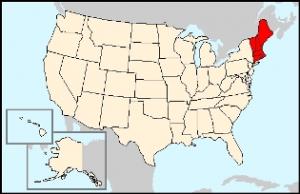This article was produced in collaboration with AlterNet and first appeared here.
No state east of the Mississippi has legalized marijuana, but that’s very likely to change this year, and New England will be leading the way. Two of the six New England states will likely let the voters make the call in November, while the others all have legalization bills pending.

So far, with the exception of Washington, DC, where voters elected to legalize the possession and cultivation, but not the sale of marijuana in 2014, all of the legalization action has been in the West. The four states that have legalized it so far — Alaska, Colorado, Oregon, and Washington — are all Western states.More Western states will likely legalize it this year, including the nation’s most populous, California, as well as Arizona and Nevada. The Nevada Regulation and Taxation of Marijuana Acthas already qualified for the November ballot, while the Arizona campaign behind that’s state’s Regulation and Taxation of Marijuana Act is well-advanced in signature gathering and appears poised to easily qualify for the ballot as well.
Meanwhile, California’s Control, Regulate and Tax Adult Use of Marijuana Act (AUMA) is late out of the gate, but well-financed and broadly supported. It, too, should be on the ballot in November.
Another possible legalization state this year is Michigan, where the campaign behind the Michigan Marihuana Legalization, Regulation and Economic Stimulus Act just last week announced that it has 240,000 raw signatures and is aiming for 300,000 by March 15. But it needs 252,000 valid voter signatures to qualify, and with the rule of thumb for petition campaigns being that between 20% and 30% of raw signatures are likely to be invalidated, whether the Michigan initiative will qualify remains to be seen.
But it’s Yankee country that will see the most concentrated regional push toward marijuana legalization this year. Initiatives that make the ballot will go before New England populations that are showing majority support for legalization this year, and, while progress toward legalization though the legislative process can be achingly difficult, the region also appears poised to produce the first state to free the weed through the legislature, not the popular vote.

Here’s the rundown on New England legalization efforts this year. Chances are good that legalization will happen in two of them — the initiative states — and possibly in one or more of the other states:Connecticut. Earlier this month, Rep. Juan Candelaria (D-New Haven) introduced House Bill 5209, which would allow adults to use, grow, and sell marijuana. Candelaria introduced a similar bill last year that went nowhere. “I’m going to be pushing very hard,”Candelaria said. “I’m going to be engaging my leadership in conversation to at least allow a public hearing.” Gov. Dannel Malloy (D) said the same day he could only support medical marijuana. “That’s as far as I’m comfortable going,” the governor said.
Maine. The legalization initiative from the Campaign to Regulate Marijuana Like Alcohol has not yet officially qualified for the ballot, but is poised to. On February 1, the campaign turned in more than 103,000 raw signatures from its petition drive. It only needs 61,000 valid voter signatures to qualify for the November ballot, and should have a sufficient cushion to do so. The most recent of Mainers’ attitudes toward marijuana legalization, from the spring of 2015, had support at 65%.
Massachusetts. The legalization initiative from the Campaign to Regulate Marijuana Like Alcohol has already qualified for the ballot, but under Massachusetts law, the legislature must first take up the issue. If, as expected, it fails to adopt legalization, the campaign must then collect another 10,000 signatures to place the initiative on the November ballot. It should be able to do that easily, and if it gets on the ballot, it should win, although perhaps not as handily as Maine. There are no hot-off-the-press polls, but a 2014 poll had support at 53% and a Boston Globe poll from last year had a dead heat, with 48% in favor, 47% opposed. Numbers this tight means it’s not a done deal, but given expected high voter turnout this election year, the Bay State should be able to pull it off.

New Hampshire. The House actually passed a legalization bill in 2014, only to see it die in the Senate. This year, there are already three legalization bills filed, but two of them have already been deemed “inexpedient to legislate” in committee. The remaining legalization bill, House Bill 1610, is currently before the House Criminal Justice and Public Safety Committee. Even if the bill were to pass the House, it faces a tough battle in the Senate. In addition to killing legalization in 2014, the Senate has at least twice killed decriminalization bills that passed the House.Rhode Island. Rep. Scott Slater (D-Providence) said he will file a marijuana legalization bill in the General Assembly last week, and Sen. Joshua Miller (D-Cranston) will file companion legislation in the Senate. As of Saturday, the bills have not yet been posted on the legislative website, but they are definitely coming. This marks the fifth consecutive year legalization bills have been filed in Providence, and they have previously been stifled, but there are signs progress could be made this year. The Senate bill has 17 cosponsors (out of 38 senators), and the House bill has more than 30 cosponsors. Republican House Leader Brian Newberry (R-North Smithfield) supports it, and House Speaker Nick Mattiello (D-Cranston), who has long opposed legalization, is now becoming “more open-minded” as eyes tax revenues from pot in the already legal states.
Vermont. The Green Mountain State is the most likely to actually pass a legalization bill this year. Senate Bill 241, backed by Gov. Peter Shumlin (D), has already passed the Senate Judiciary and Finance committees and is moving toward a Senate floor vote. But the committees have amended the bill to kill home cultivation and to reduce the legalized amount from an ounce to a half ounce. And if and when the bill gets out of the Senate, it still faces a tough battle in the House.
This could well be the year New England goes green. Winning in three states — Maine, Massachusetts, and Vermont — would be a big victory; winning in more would be a very pleasant surprise. Not winning in any of them would be a huge setback for the marijuana reform movement, but at this point, that looks extremely unlikely.

